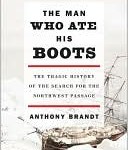By Anthony Brandt
Once there was a gentleman by the name of John Barrow. He was Britain’s Second Secretary of the Admiralty during the first half of the 19th century. Don’t let that “Second” fool you; he was where the buck stopped, and the Royal Navy was no small potato.
Barrow had a flea in his ear. It was called the Northwest Passage, through which a ship could dash to the silks, spices, and gems of the East without the time and bother of Cape Horn’s rude weather. Problem was, as Anthony Brandt explains in this detailed account of Britain’s heroic if hellacious forays into the ice-choked northern archipelago, Barrow didn’t know a fig about the passage. But there was no telling him that.
Brandt is a well-tempered storyteller, both thoroughgoing and agile, who knows what to do with a tale of high color and noble folly when it bites him on the knee. He proceeds roughly chronologically, but is unafraid to circle back—much like his subjects—to gain perspective, then push ahead into the tale’s uncharted territory. He also understands that the quest for the Northwest Passage had little to do with trade and everything to do with the brash character of the Royal Navy.
The navy epitomized Britain’s triumphalism after the victory over Napoleon, its sheer global superiority, but it was also at odd ends without war to occupy its ships and sailors—and idle hands were the rabble’s playground. The admiralty’s answer was to get them to work fulfilling empire’s expansionist destiny.
Exploration was part of the Royal Navy’s tradition, and for a northern seafaring nation, northern waters were its bailiwick. The navy was at its apex, an indomitable force that could and would do as it wished. If the Second Secretary had an idée fixe, the navy would sally forth and fixe it.
Barrow was adamant that the polar sea was open water, tonsured by a ring of ice. He simply knew that choppy, salt water would not freeze. Never mind that whalers, who had been plying the waters off Greenland and northern Canada for many years, told him otherwise. And no matter that many said the passage was a fraught, undependable route East. Barrow would send ships to break through the ice and discover the fabled waterway, because it was Britain’s honor that it be done. “The example of Captain Cook lay before them…The question of usefulness missed the point.”
So enter the players in this drama, a varied and appealing cast whom Brandt affectionately draws. And why not? High-born, grocer’s son, lowly seaman, surgeon, shipwright, purser, cartographer, artist—across the board, they were a decent, spirited bunch, with mind-boggling fortitude and daring. Pig-headed, too, of course.
In all, Brandt expertly covers forty expeditions associated with the Northwest Passage, starting in 1818 with John Ross’s woefully received skirmish with the ice in Lancaster Sound—Barrow considered him a wimp for turning back—and ending in 1880. Along the way, Brandt fashions an otherworldly Arctic, its water sky and ice blink, fogs and auroras, where it snows on a clear day and the natives make sleds out of frozen fish.
While a host of explorers play important roles in the story—Ross, William Edward Parry, George Back, John Richardson, and a Brandt favorite, the canny, intrepid John Rae—it pivots around pudgy, demure John Franklin.
From 1819 to 1822, Franklin led the land leg of a pincer probe to the passage, with Parry in command of the sea leg. Franklin’s tribulations were godawful: intergalactic cold for ten months, then two months of mosquitoes so thick they blotted out the sky, incomprehensible natives, treacherous trappers, land so barren he was reduced to eating lichen, then his boots. Temperamentally, he just couldn’t see through local eyes the way to live in that withering place. But he survived and became a national icon, the emblematic figure of true grit.
What Franklin is best known for, however, is going missing into the thin Arctic air during his 1845 expedition. Brandt makes the sad but true observation that the many expeditions sent in Franklin’s search did more to unravel the Arctic maze than the original endeavors.
Today, the Northwest Passage is a done deal, thanks to climatic warming. You can even bully your way to the North Pole as a tourist on a gaily painted icebreaker; only the wine is chilled. Better that than Franklin’s fate, when his boots finally failed him, let alone a stiff upper lip.
(from the San Francisco Chronicle)
